By Kent R. Kroeger (Source: NuQum.com, August 16, 2022)

The Constitution does not prohibit the citizens of each State from regulating or prohibiting abortion. Roe and Casey arrogated that authority. We now overrule those decisions and return that authority to the people and their elected representatives. (U.S. Supreme Court’s June 2022 ruling on Dobbs v. Jackson Women’s Health Organization)
When the U.S. Supreme Court (SCOTUS) ruled on Dobbs v. Jackson Women’s Health Organization that the Constitution of the United States does not confer a right to abortion, the court overruled both Roe v. Wade (1973) and Planned Parenthood v. Casey (1992). As a result, the decision gave individual states the full power to regulate abortion.
The fire and fury from the political left was instantaneous.
“The people who will lose access will be Black women, brown women, poor women, and young women,” said sociologist Kimberly Kelly just prior to the SCOTUS ruling. “If Roe is overturned, abortion is going to become a function of class privilege. Affluent women who can travel, will travel. Only women with certain levels of economic resources will be able to travel.”
“People will die because of this decision,” New York House member Alexandria Ocasio-Cortez said soon after the decision was handed down.
But was the predictable furor warranted?
What the ruling did not do was end legal abortion in the U.S.
To the contrary, the great irony of the Supreme Court’s Hobbs decision is that it will, at a minimum, reaffirm the status quo on abortion as established by Roe v. Wade, and could potentially move the ball further in the direction of unconstrained abortion rights.
States that already strongly affirm abortion rights (e.g., California, New Jersey, Washington, etc.) are poised to further codify those rights. States that used Roe v. Wade to limit abortion rights are likely to legislatively endorse those restrictions.
So how did the Dobbs ruling change the status quo on abortion rights?
It is still early, but most likely the SCOTUS ruling will reduce restrictions on abortion rights for the vast majority of American women.
A recent vote by Kansas voters on abortion rights lays out the problem pro-life advocates face across the U.S.:
An increase in turnout among Democrats and independents and a notable shift in Republican-leaning counties contributed to the overwhelming support of abortion rights last week in traditionally conservative Kansas, according to a detailed Associated Press analysis of the voting results.
A proposed state constitutional amendment would have allowed the Republican-controlled Legislature to tighten restrictions or ban abortions outright. But Kansas voters rejected the measure by nearly 20 percentage points, almost a mirror of Republican Donald Trump’s statewide margin over Democrat Joe Biden in the 2020 presidential election.
Does the Kansas vote on abortion rights expose the GOP’s vulnerability on abortion?
Of course it does.
The GOP refuses to accept that the U.S. social consensus on abortion is that it should be legal, with restrictions only on late-term abortions.
The GOP can argue the morality of abortion to the end of times, but their policy prescriptions are only impactful if they can get the majority of Americans to legislatively agree with their abortion policies.
Kansas is evidence that they face an uphill battle.
Through the Hobbs decision, SCOTUS gave the abortion decision to states, and, in practicality, is bringing U.S. abortion law into alignment with public opinion.
As someone who calls himself pro-life, I am wholly aware that my views on the issue are at odds with most Americans. I am pro-life in a country that has few qualms about exterminating the unwanted unborn.
“They are just a collection of cells.” “They aren’t sentient.” “They don’t feel pain.” “Human life begins after the baby exits the womb.”
I’ve heard all of those rationalizations and intellectual gymnastics in justifying a pro-choice position. I disagree with those arguments, but I also recognize that this is the public consensus on abortion in the today’s United States.
And the GOP may be reminded of that reality in the upcoming midterm elections.
U.S. state-level public opinion on abortion
The American National Election Studies (ANES) project, funded by the National Science Foundation and currently managed by the University of Michigan and Stanford University, conducted a national survey of 8,280 vote-eligible U.S. adults before the 2020 presidential election.
Among the questions asked in that survey was a question on how respondents placed themselves on a 5-level scale regarding abortion rights:
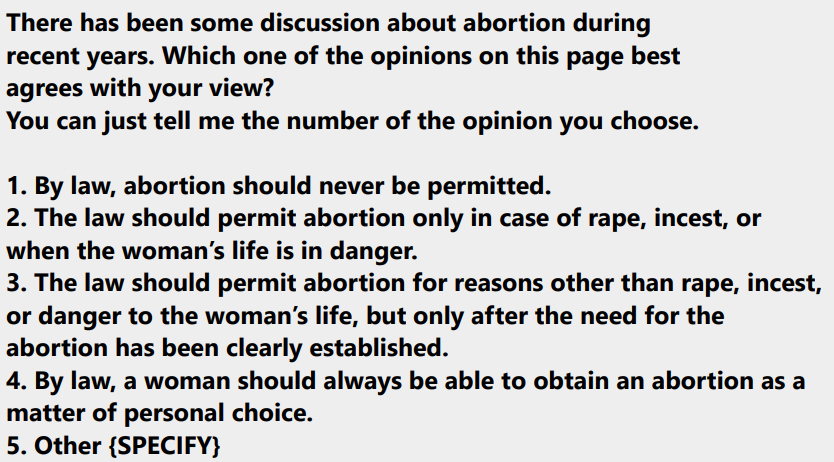
According to the 2020 ANES, 61 percent of U.S. adults believe, at a minimum, abortion should be allowed “after the need…has been clearly established.”
The results of this survey, unaffected by the SCOTUS’ Hobbs decision, indicates the national consensus on abortion is that it should be legal and only restricted when the need to abort the child is not clearly established.
I am pro-life, but I live in a pro-choice country. I can pretend otherwise, but that would make me delusional.
Among those states with enough ANES sample cases to be analyzable, public opinion in 74 percent of states support abortion rights when a need is established (see Figures 1a —1g).
Figure 1a: Abortion attitudes in the Northeast U.S.
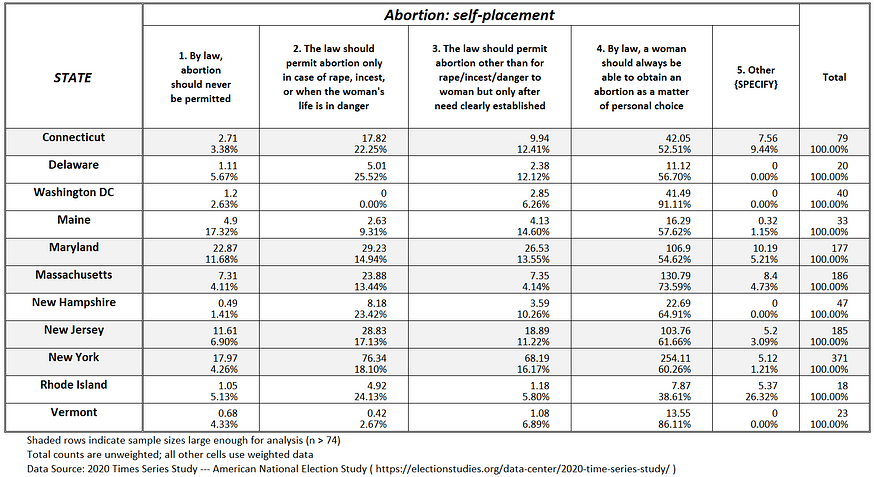
Figure 1b: Abortion attitudes in the Southern U.S.
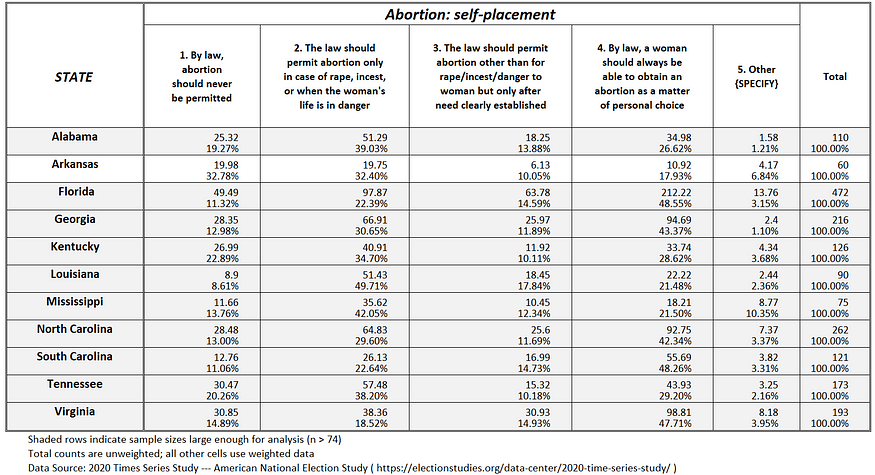
Figure 1c: Abortion attitudes in the Industrial Mideast U.S.
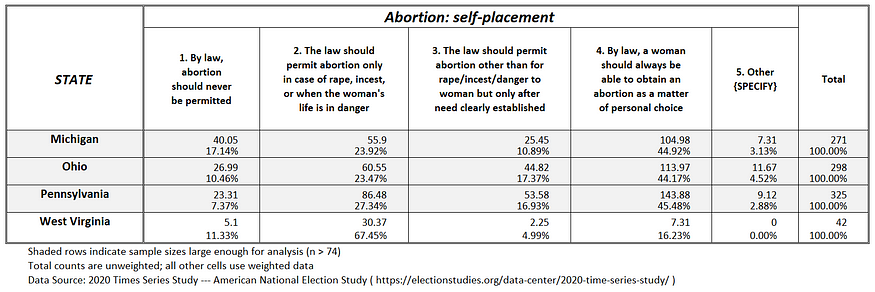
Figure 1d: Abortion attitudes in the Upper Midwest U.S.
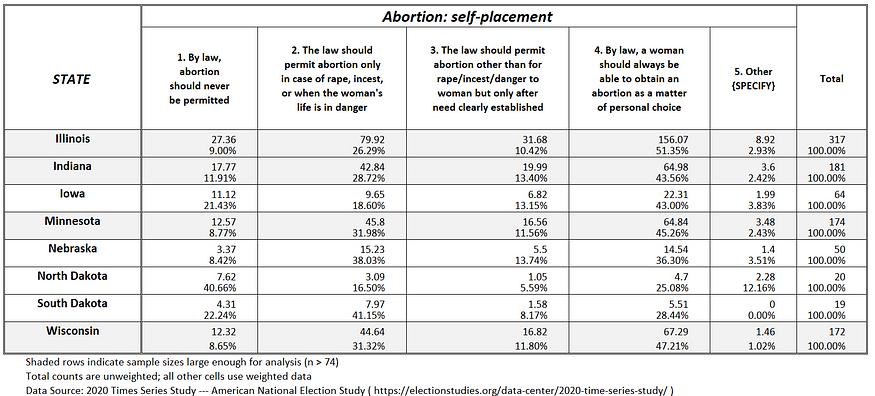
Figure 1e: Abortion attitudes in the Lower Midwest U.S.
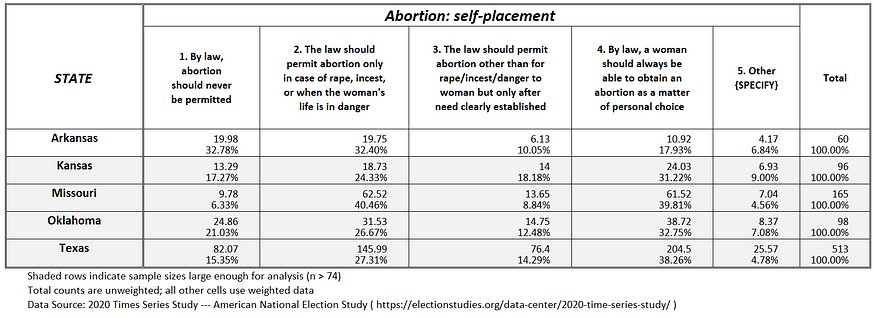
Figure 1f: Abortion attitudes in the Mountain U.S.
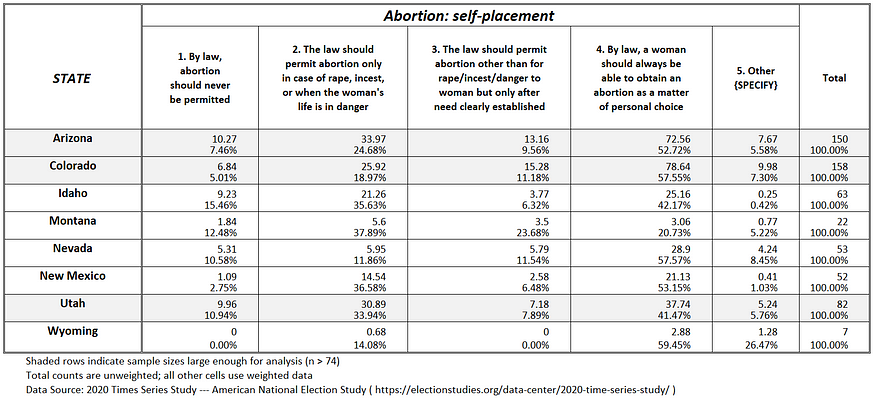
Figure 1g: Abortion attitudes in the Pacific West U.S.
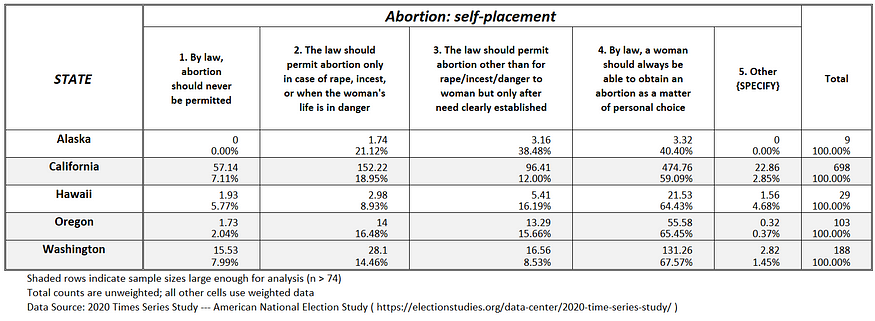
In the U.S. today, public opinion leans decisively against the pro-life position.
I am resigned to that reality.
But what I cannot understand is the unwarranted hyperbole of people like Dr. Kelly and Rep. Ocasio-Cortez who suggest the Hobbs decision will rollback abortion rights in the U.S.
The exact is opposite is going to occur — and Kansas is the first example of this dynamic.
If one compares existing abortion policy in the 50 states (plus D.C.), as shown in the title graphic, with actual public opinion (see Figures 1a-g), it suggests that when the abortion issue is presented to voters, at least 20 out of the 50 states (plus D.C.) will reduce restrictions against abortion, not increase them (States likely to reduce abortion restrictions include: Alabama, Arkansas, Florida, Georgia, Indiana, Iowa, Kentucky, Louisiana, Massachusetts, Missouri, Nevada, Ohio, Oklahoma, Pennsylvania, South Carolina, South Dakota, Texas, Utah, Virginia and Wisconsin).
For example, post-Hobbs, Alabama has effectively banned abortion, according to the Guttmacher Institute. Yet, based on public opinion in Alabama as measured by the 2020 ANES (see Figure 1b), 80 percent of adult Alabamans believe abortion should be allowed at least in cases of rape, incest, or when the woman’s life is in danger.
And it is not just in the American South where state abortion policies are disconnected from public opinion. Wisconsin is a state with significant restrictions on when an abortion can occur (again, see a Guttmacher Institute analysis of state-level abortion policies); yet, public opinion in the state (see Figure 1d) indicates 59 percent of Wisconsin residents believe abortion should be allowed after a need is established, irrespective of how long the woman has been pregnant.
The strongest conclusion one can draw is that state’s like Alabama and Wisconsin are going to reduce abortion restrictions, not increase them post-Hobbs.
Only three states — Idaho, Montana, and (maybe) Rhode Island — will potentially rollback abortion rights once the issue is brought before voters. But they are the exception.
It is true that having a directly expressed constitutional right (e.g., freedom of speech, religion, privacy, and gun ownership) is a more irrevocable right than a right dependent on voter approval or implied-right arguments. But it is also true that public opinion drives election outcomes far more directly than sometimes abstract constitutional rights.
Current polling data says abortion is now one of the most important issues among voters heading into the 2022 midterm elections.
I suspect the Republicans have squandered their many advantages heading into the 2022 midterm elections. Sure, they may well regain control of the House of Representatives, but are they in any position to lead the country?
If I were a Democrat, I would be quietly cheering the Hobbs decision — it can only help the Democrats’ prospects in the midterm elections. If I were a Republican, I would spend the next four months focusing on inflation, economic stagnation, and the aching incompetence of the current administration.
- K.R.K.
Send comments to: kroeger98@yahoo.com

